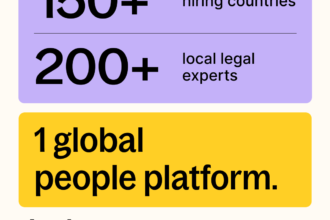When expanding into international markets, businesses face a critical decision: Should they set up a legal entity or use an Employer of Record (EOR)? Both options enable global hiring, but they differ in complexity, cost, and compliance requirements. This blog explores the key differences between an EOR and establishing a legal entity, helping you determine the best solution for your business.
1. Understanding Employer of Record (EOR)
An Employer of Record (EOR) is a third-party organization that legally employs workers on behalf of a company. The EOR handles:
- Payroll processing and tax filings.
- Compliance with local labor laws.
- Employee benefits administration.
With an EOR, businesses can hire employees in new countries without setting up a legal entity, making international expansion faster and more cost-effective.
2. Understanding Legal Entity Setup
A legal entity is a company’s registered business presence in a foreign country. This involves:
- Registering with local authorities.
- Opening a business bank account.
- Managing payroll, taxes, and compliance independently.
While a legal entity provides complete control over operations, it requires significant time, investment, and administrative effort.
3. Key Differences Between EOR and Legal Entity
| Factor | Employer of Record (EOR) | Legal Entity Setup |
|---|---|---|
| Setup Time | A few days to a few weeks | Several months |
| Compliance & Payroll | Managed by the EOR | Handled by the company |
| Costs | Lower upfront cost | High registration & operational costs |
| Control Over Operations | Limited (employment aspects only) | Full control |
| Best for | Quick market entry, testing new markets, hiring remote teams | Long-term presence, full business operations |
4. When to Choose an Employer of Record (EOR)
An EOR is ideal if:
- You need to hire employees quickly without dealing with legal complexities.
- You want to test a new market before making long-term commitments.
- You prefer to avoid high setup and operational costs.
- Your workforce consists of remote or distributed teams.
5. When to Set Up a Legal Entity
A legal entity is suitable if:
- You plan for long-term expansion in the country.
- You need complete control over business operations.
- You want to build a physical presence with offices, warehouses, or infrastructure.
- You are ready to handle legal and financial responsibilities in-house.
Conclusion
Choosing between an Employer of Record (EOR) and setting up a legal entity depends on your business goals, budget, and long-term plans. If you need speed, flexibility, and cost savings, an EOR is the best solution. If you seek full operational control and a permanent presence, setting up a legal entity may be the right path.







